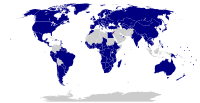
Photo from wikipedia
We extend the classic Zodrow–Mieszkowski model of tax competition with a public input to the case where there is skilled and unskilled labor. The policy rule governing the optimal provision… Click to show full abstract
We extend the classic Zodrow–Mieszkowski model of tax competition with a public input to the case where there is skilled and unskilled labor. The policy rule governing the optimal provision of the public input contains a new term capturing an equity effect that takes into account the disparity in wages between skilled and unskilled workers. The equity effect can work in the opposite direction of efficiency. Under a coordinated policy reform across countries, total welfare improves unambiguously if the public input is underprovided prior to the reform and a concern for equity enhances the effect of improved efficiency on welfare. However, total welfare may also improve even if the public input is initially overprovided if the improvement in the unskilled wage due to the reform is large enough.
Journal Title: Public Finance Review
Year Published: 2017
Link to full text (if available)
Share on Social Media: Sign Up to like & get
recommendations!